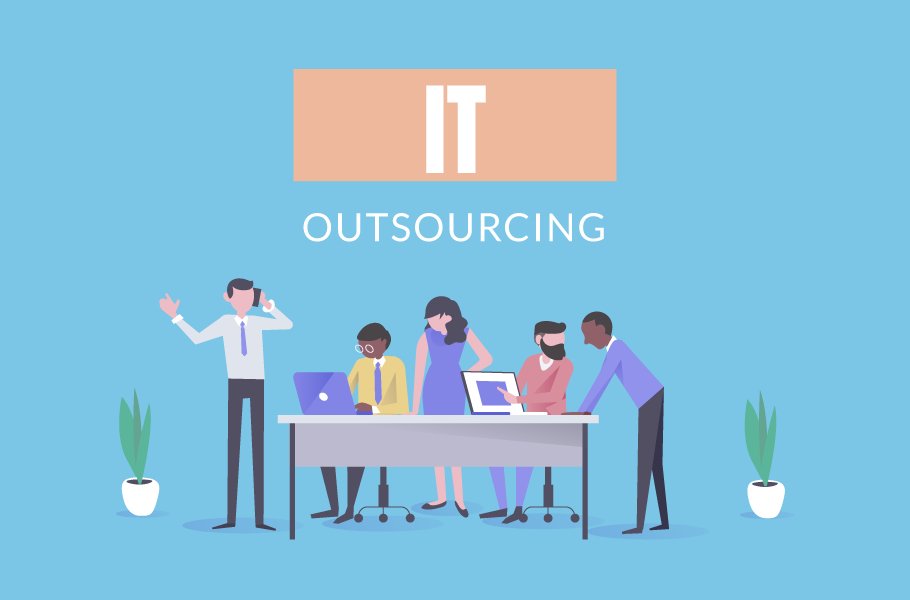Outsourced IT support is a growing industry. True to its name, outsourcing is the act of companies using external service providers to help with everything from infrastructure to application services, and business process that surrounds information technology, or IT, as it is commonly known all over.
IT outsourcing is a booming business worldwide, and the staggering figures below are just the tip of the iceberg.
- As of 2019, IT outsourcing revenue generation was $92.5 billion annually.
- By 2025, the IT outsourcing industry is expected to hit $425.19 billion.
- Up to 66% of US companies, big and small, outsource IT support.
The above statistics about information technology reveal that outsourcing is a vital part of the industry that has revolutionized our world.
IT outsourcing providers – what are they?
Third-party services that provide technical support from remote locations to onshore and offshore companies are known as IT outsourcing providers. Outsourcing companies are usually referred to as MSPs or managed service providers.
Managed service providers are different from local technicians or developers that provide an instant fix to technical problems. Local IT technicians often work on an hourly basis – meaning your company can hire independent or freelancers without having a partnership with them.
On the other hand, MSPs have a partnership with companies that use their services. IT outsourcing providers do not just fix broken connections. A managed service provider does everything from installing, supporting, monitoring, and implementing software and programs.
MSPs also provide security of network computing and every technical requirement your company needs to do business. Some MSPs are located around the globe from the Americas, to South East Asia, Western Europe and other other continents are also available.
Types of IT outsourcing
Broadly classified, IT outsourcing is of two types:
Co-managed IT outsourcing
As the name implies, co-managed IT outsourcing is when you outsource only a part of your company’s requirements. Here, you have a dedicated in-house IT staff responsible for general computing, hardware, and software issues.
The outsourced support takes care of the 24/7 cybersecurity monitoring that your in-house team does not have the expertise or the resource to execute. Outsourced experts can also help with an overworked IT department and increase the overall efficiency of your organization.
In addition, supplemental or co-managed IT outsourcing can dramatically reduce the cost your company may be required to pump into the department. However, the overall responsibilities of the outsourced help depend on the package offered by the outsourcing services.
Co-managed IT outsourcing packages are relatively cheaper than fully outsourced packages. Outsourcing a part of the technical help that can work with an in-house team is a fantastic way to make the best decisions that can transform your business goals.
This type of outsourcing is a great choice if you run a large business, but co-managed IT outsourcing can be expensive for smaller organizations.
Complete IT outsourcing
Complete or full outsourced IT support is when your company does not have an in-house team for your technical and information technology needs. Instead, you outsource the help from a third-party service provider called the MSP.
In this case, the managed service provider is responsible for troubleshooting, updates, and backups to monitoring. Networking computing and servers are also managed and stored by MSPs locally or on cloud apps and other off-site data centers.
You can also partner with MSPs for special projects, strategic consulting, and vCIO services. Understandably, fully outsourcing IT support will cost more than supplemental or co-managed IT outsourcing.
The advantages of complete/full IT outsourcing are many, as you have little to worry about the technical aspects of your business. However, narrowing down on the right MSPs that mirror your organization’s exact needs and goals at the right price can be tricky.
Why outsource IT support?
Some of the biggest names in business outsource IT, which promptly raises the question – of why. Why is everybody outsourcing information technology support from different parts of the globe? Below are the top reasons why:
Cutting costs
A primary reason for many companies outsourcing IT support is to cut costs, according to a Deloitte survey. Up to 70% of companies that outsource support for information technology cite the drastic reduction in the overall cost.
Outsourcing is dramatically cheaper than having an in-house team because they come from countries with low labor costs. The country rounding the list of the top destination for IT outsourcing are India, followed closely by the United States and China. Other countries that provide IT outsourcing include Malaysia, Brazil, and Indonesia.
Flexibility
Up to 40% of companies that outsource cite flexibility in running their business. With IT experts working round the clock and providing real-time remote support, every technical issue is taken care of almost instantly.
As the company scales in size and revenue, restructuring is inevitable. While the top players in the company are engaged with new and tougher responsibilities, outsourcing support takes care of the old liabilities, so there is no disruption in the workflow.
Speed to market
Another reason why IT outsourcing is common among companies is speed to market. As much as 20% of companies consider that outsourcing helps them to establish their brand/company’s presence in the industry quickly.
Since the competition in any type of business is cutthroat, outsourcing is a fantastic way to generate an idea, develop it, and take it to the market before the competitors.
Access to tools
More than 15% of companies also rely on outsourcing because it gives instant access to tools and processes. When a team of IT professionals is on hand to provide everything from technical support, security, software development, and technical issues, it is a resource very few businesses will not use.
Other reasons why companies turn to outsource IT support include agility and scalability.
What is the cost of outsourcing IT support?
The average cost of outsourcing IT support generally ranges from $80 to $150 per month. However, the cost of outsourcing IT support depends on several factors, including:
- The service package pricing type: Per month and flat fees are two of the most common pricing offered by outsourcing companies.
- The number of employees in your company: The more the number of employees in your company, the higher the cost of outsourcing. IT outsourcing companies usually offer packages for 25 employees and above.
- Location of the outsourcing company: South East Asia has the lowest costs of outsourcing, followed by Latin America. Eastern Europe IT providers are also relatively affordable, while the highest prices belong to the US.
- The specialization and the expertise of the support team: Junior to mid-level developers come with lower costs ranging from $18 $25 to $42 per hour. UI/UX designers, QA engineers, and senior developers have the highest costs, ranging from $110 to $163 per hour.
- Whether the outsourcing company uses a traditional or advanced technology: The latest technologies are usually pricier than traditional ones, but they have more success and are cost-effective in the long run.
In this regard, budgeting for IT outsourcing, getting the service from a credible service provider, and understanding the type of packages can make a big difference.
MSPs usually have three types of pricing packages for IT outsourcing. These include:
- Flat fees:Managed service providers that offer flat fees are very popular. Depending on the outsourcing company, the flat fees usually provide unlimited support. This can seem like an unbeatable offer, but it is important to understand the MSPs’ terms and conditions that offer flat fees. Unlimited support from an outsourcing company does not always mean it covers hardware setup fees or on-site support. Flat fees are not the ideal/recommended fee structure because you can end up paying more.
- Hourly fees:Most MSPs offer their services with an hourly charge, which is usually a good choice if your business is small. Smaller businesses do not require full-on or 24/7 technical support, so contracting a developer or a designer on an hourly basis is usually a good option. However, working with MSPs that charge hourly fees do not work for bigger companies that need constant tech support. In addition, most outsourcing companies that have this fee structure will not hesitate to overcharge once you cross the contractual hours.
- Per month/per user: MSPs that charge per user/per month offer the best deal because there are no hidden fees. When you make a down payment per user or per month, the outsourced IT experts will take care of everything from basic computing to updating and installation to complex network management. Most credible IT outsourcing providers offer this fee format, which works for all types and sizes of businesses. Per month/per user fee structure is also the best way to get a good deal and avoid overpaying an overseas outsourcing company.
Regardless of the MSPs’ pricing format you choose, it is paramount to understand all the packages’ terms and conditions of the contract before you sign it.
What IT solutions do outsourcing provide?
The type of IT solutions provided will vary from one outsourcing company to the other. But generally, outsourcing providers cover the following components.
Network management and security
Network security and management is a big issue with companies regardless of size and location. Any breach in your network compromises the data and information related to the company and the clients.
IT outsourcing providers become responsible for ensuring top security for your network security and managing it. The best MSPs cover everything from breach prevention, security alerts, system and monitoring reports, and maintenance notifications.
Troubleshooting support
MSPs regularly take care of these issues, from mobile networks and computing to the integration/updating of software systems. Implementing system programs, network synchronization, and all types of hardware and software troubleshooting is also a key component offered by IT outsourcing companies.
Backup and recovery
IT outsourcing companies are also experts at backing up and recovering data for your systems. These malfunctions can be due to human error, a ransomware attack, or a natural disaster that can take hours to recover.
MSPs are equipped to back up and recover by employing skills such as copying data, reestablishing access after a power outage, and having a solid recovery plan.
Real-time support
Managed service providers are usually the first line of support when it comes to technical-related issues. The tech support executives provide real-time support for hardware and software issues, monitor and manage user requests, and handle daily communication issues.
IT outsourcing companies also provide a centralized resource so your organization can facilitate and troubleshoot problems very effectively. Real-time support is usually through phone, but live chat and email support are also available depending on which company you work with.
Cloud management
With more companies transitioning to cloud applications, MSPs are also providing cloud management as part of their solutions. The common features of cloud applications and management include securing SaaS apps, setting up, and managing file-sharing privileges.
Companies that outsource IT support also automate software deployments for cloud-based applications. An increasing number of MSPs also help companies manage SSO or single sign-on, where everyone in the company uses 1 ID and a password to access cloud-based applications.
Inventory management
Managed service providers also offer support for device and inventory management. Under this, they help with device/hardware procurement, custom configurations, and device provisioning. Mass-remote management and real-time tracking of the devices are also part of this support process.
Storage
MSPs also provide storage support for the top companies worldwide. Not only do they provide support for infrastructure, but also assessing the storage setup inventory for maximum efficiency is part of it. Some IT support companies also provide integrated software and hardware integration services.
Security within the organization
Security and compliance within the organization is another support available with most MSPs. Improving the auditing process, configurations for cybersecurity, and managing firewalls and MFA or multi-factor authentication. Most MSPs also offer expertise in enforcing security policies, including BYOD management and requiring employees to reset passwords regularly.
Telecommunications
IT outsourcing companies also help with phone and PA systems and hardware related to telecommunications. Testing the phone lines and internet connections and choosing the right service provider is among the activities involved in this process.
Data monitoring
Data monitoring is another support you can get through outsourcing. Under this, MSPs identify the vulnerabilities within the organization and the type of support that your team requires the most, which is usually streamlined through a dashboard.
Managed service providers also identify the security trends for operational efficiency, so your team has a good idea about the user-end requests.
Surveillance
MSPs also offer surveillance support by recording and managing effective security systems and security cameras. Surveillance is a crucial requirement for businesses and companies to protect their assets from theft – internal or external.
It usually involves installing cameras in dedicated locations or investing in a widespread security system that covers multiple locations.

How outsourced IT support helps your business
The reasons why top companies outsource IT support discussed in the above section should give you some idea about how beneficial it is. However, if you’re looking for specifics, here’s how outsourced IT support can benefit your business.
Reduce the costs
When your company outsources, there are several ways to cut costs: employee training, providing wages and benefits, buying hardware/software, storage, and equipment.
Your company can also choose to pay only for a project on a contract basis, which is very cost-effective.
Top IT security
Credible IT outsourcing providers are compliant with industry-level security rules and regulations. Security measures are paramount to minimize security risks associated with your company’s information and data.
IT outsourcing companies have experts ranging in software development, telecom, hardware, software, and security. So even in case of security breaches, having professionals take care of it can greatly benefit your company.
More time to focus on your business
As the professionals take care of your networking, hardware, and other technical problems, this gives you the flexibility and time to focus on running other aspects of your business.
Improve your team’s productivity
In most cases, smaller companies do not have the budget to hire the level of expertise that they need. Working with a team of IT professionals also gives your team a level of productivity that they would otherwise not be able to.
In addition, employees in your company can also have access to a pool of tech-savvy personnel and resources, which can improve productivity in a significant manner.
Staying up to date
The rate at which technology keeps becoming obsolete is astounding and can be expensive. Updating technology requires procuring the resources and training the in-house team to update their knowledge about it.
When you outsource, the provider is responsible for keeping up to date with all things related to networking and information technology, and you don’t have to worry about it.
When is IT outsourcing required?
Outsourcing IT support has several advantages that will benefit your company. But is it time for your organization to outsource help? Identifying the scenarios below can help you decide.
Your goal is to cut IT costs.
Companies and businesses can always benefit from cutting costs in any way that they can. As highlighted above, outsourcing IT support can help you reduce the cost of several aspects, from administration and training to procuring.
MSPs are experts at handling everything from computing networking issues without involving your company’s personnel and resources. Therefore, if you want a separate entity to take care of all your IT needs, it might be time to outsource.
There is no in-house IT team.
Small to medium companies rarely have the budget to hire a dedicated in-house IT team. This means that many companies do not get the expert help they require to make the organization more productive or effective. An expert developer will have a high salary demand, and the cost of training your employees can also be expensive.
Outsourced IT support usually cost a fraction of the cost, so you forgo the burden of hiring a senior developer or training your employees.
You want your in-house IT staffers to have extra help.
In addition to an in-house IT staff, you might also want to outsource because your company needs the extra help. In-house teams can take care of the smaller responsibilities such as computing, security patches, and software installation.
But a managed service provider can take care of other issues and components, such as network computing which can be endless to manage. MSPs also have top-of-the-line software and hardware, and outsourcing allows you to tap into their resources at half the cost.
Pros of outsourcing IT support
- Budgeting for the IT department is effortless since you know how much the MSPs cost in advance.
- Huge cost savings from procuring, training, and maintenance.
- Instant expert support for technical, user end, and network issues.
- Unrivaled security for any type of breaches – internal and external.
- Staying up to date with all your technological devices and resources.
- Unlimited access to top professionals in the IT industry.
- Improved productivity as your team can focus on core functions without worrying about complicated tech problems.
- Reduced risk of damage, loss of data, and cyber-attacks.
- Improved customer service as you have visibility into user-end demands.
Cons of outsourcing IT support
- The MSP’s objectives, services, and packages may not align well with your organization’s needs and goals.
- Offshore MSPs also might be unaware of the legal aspects of your company’s origin country, which can pose a problem with security.
- Working with an offshore managed service provider may pose a downtime problem due to differences in time zones or a lack of experienced personnel when needed.
- Some MSPs require their partners to use proprietary software, which can be problematic in several ways. It limits your flexibility as the provider’s software will need precedence, and your organization will have difficulty working with other providers/apps/software.
Wrapping up
Outsourcing IT support helps your business with cost-efficiency, increases productivity, and keeps you up to date with the ever-evolving technology. MSPs also help your business be at the front in the industry, which translates to the overall growth of your company – and it is the ultimate goal of every business.
Need Outsourced IT Support?
If your company needs outsourced IT support, then contact Pennyrile Technologies today. We offer co-managed and complete IT outsourcing for small and medium businesses. You’ll get the flexibility and cost savings that an MSP can provide your business.




